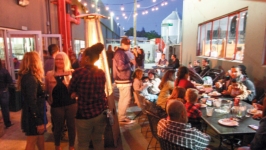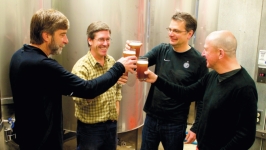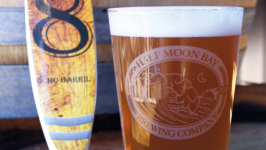Women in Beer: Meet the Masters
Silicon Valley Women Tap into the Brewing Business with Gusto
“She doesn’t look like a brewer.”
Alisha Blue, head brewer of Freewheel Brewing Company, overheard the crack at a brewpub. “Well,” she remembered thinking, “what do you want me to look like? You don’t have to be a big burly bearded person to brew beer.”
Look around at brewpubs and brewery taprooms and you’ll find plenty of women working at breweries, although not many are in the lead roles of head brewer or CEO.
A study conducted at Stanford University by Drs. Sarah Soule and Shelley Correll analyzed a 2014 brewery database to determine the number of female brewery CEOs and head brewers and brewmasters. They found a scant 2% of breweries employed female brewmasters and only 3% were led by a female CEO.
It probably won’t come as a surprise to learn that in an area renowned for its supercharged entrepreneurial spirit, two of these women leaders in beer are right here in Silicon Valley.
Meet Jenny Lewis and Alisha Blue.
Jenny Lewis, CEO, Strike Brewing
Jenny Lewis describes co-founding Strike Brewing Co. with Brewmaster Drew Ehrlich as “home brewing-gone-too-crazy story.” It began in 2008 when she met Drew Ehrlich through her future husband, Ben Lewis. “I had dabbled a little bit with home brewing and was interested in the industry because I was already in food and beverage. Ben had no interest in learning how to brew, but Drew was all over it. So I showed him how to do it and gave him all my equipment. He went crazy with it. It became one of those obsessive hobbies we were doing every weekend.”
From those weekends, a business was born. “Drew and I started talking about how we wanted to do own our own thing and a year later we decided to make a go of it. We loved the whole craft idea and there weren’t a whole lot of companies brewing.” So, Jenny quit her job to get an MBA at Rice University, and Drew started as brewing assistant at Sunnyvale’s Fire House Grill & Brewery, learning how to use commercial equipment.
After nearly four years of planning, they launched Strike Brewing Co. at the end of 2011 as a contract brewery, using the equipment at San Jose’s Hermitage Brewing to brew and package the beer. All the while, Jenny searched for a space to build out Strike’s own brewery and taproom, which opened in San Jose in 2014. Strike has since gone on to win a number of medals at national brewing competitions.
Starting a business had been a longtime goal for Jenny. “Ever since I was in high school, I knew I wanted to be an entrepreneur, own my own thing, create my own schedule, create jobs. I just was never sure what industry to do it in. When I graduated from college, I thought my dream was to be a wedding planner. I wanted to be like J. Lo in The Wedding Planner,” she recalls, chuckling.
She became certified to become a wedding planner, and while launching her own wedding planning business she met a group starting a bakery in her hometown of Los Altos and was hired as a catering manager. Her career grew and she began training staff, managing new store openings and being in charge of retail operations. “I got a lot of experience doing everything but the baking, and that’s really similar to what I do at Strike, as I do everything but the brewing.”
Despite her success in baking, something was missing. “I didn’t have a passion for cake and baked goods. I really wanted to start and own my own thing. The bakery was a great learning experience, but it was more about branching out on my own and getting involved in an industry I was really passionate about.”
Alisha Blue, Head Brewer, Freewheel Brewing Company
Alisha Blue arrived in Palo Alto in 2014 after brewing English ales in the United Kingdom. Imagine her surprise when she found out Redwood City’s Freewheel Brewing Company was looking for someone to brew English-style cask ales. “I found Freewheel on the internet. English-style cask ale breweries don’t exist much in the States at all,” she says.
While cask ales are flavorful creations, they are traditionally brewed to enhance food and conversation at the pub rather than dominate it the way aggressively flavored high-alcohol beers found throughout California often do. Unlike keg beer, which is carbonated by forcing CO2 to dissolve into the brew, cask ales continue to ferment as they are dispensed from the cask creating their own carbonation, and resulting in gentler mouthfeel and more rounded flavors.
“We brew English-style recipes, so we use ingredients like English barley and hops, and then an English yeast strain which gives it a distinct characteristic,” says Alisha. “The brewing process is pretty much the same as a keg beer. Normally, if you’re brewing a keg beer, you’d want the beer to ferment completely out so there’s no more yeast activity, and then carbonate it. What we do is stop the fermentation a little before it’s finished, cool down the yeast so they go into hibernation and put it in a cask. Then it wakes up and we get that carbonation in the cask.”
For Alisha, a career in brewing was launched by curiosity, opportunity and circumstance when she moved to Munich, Germany. “I quit my job and was looking for something new. I’d heard of Siebel Institute’s brewing programs and knew they partnered with Doemen’s in Munich. So, it seemed like a great time to go back to school and change careers.” She spent seven weeks studying brewing at the acclaimed Siebel Institute of Technology in Chicago, and then 14 weeks in Munich at Doemen’s to complete her degree. Shortly afterward, she moved to England for her first brewing job at Roosters Brewing Company in North Yorkshire before coming to America.
As for working as a brewer, Alisha says “It’s definitely a place you’re not going to make a lot of money so you have to have that drive. It’s a back braking hard job, but it’s very rewarding, because especially with beer, compared to other types of alcohol, you can turn it around in two weeks and get instant gratification. It’s fun for experimentation because you can quickly improve your process. Being in the pub, you can see people through the window drinking your beer, and that’s great.”
Pink Boots Society: Giving Brewing Women a Leg Up
What’s a Pink Boots Society?
Literally, it’s a pair of pink steel-toed work boots and 1,500 people working together to inspire and encourage women beer professionals. Founded in 2007 by brewers Teri Fahrendorf and Laura Ulrich, the nonprofit, national organization raises money for scholarships through various activities, most notably the Collaboration Brew Day held each year on March 8, International Women’s Day. All across the country on that day, the organization teams with participating breweries to brew special themed beers. A portion of the sales goes toward the scholarship fund.
As for those coveted pink boots? That’s what the winners of the Pink Boots Society’s scholarships receive, along with the opportunity to attend classes, camps and tours to advance their education in the beer business.
In addition to scholarships, the Pink Boots Society performs other roles for women in the brewing industry, such as providing fun social opportunities to share experiences. As Laura describes it, the organization is not so much about breaking barriers, but giving women opportunities to move forward. “We want women to learn they can have a passion for beer and a place in this profession.”




